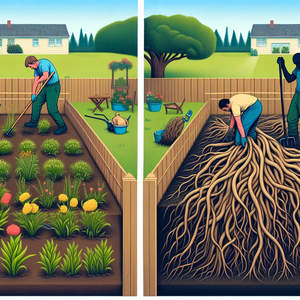The Future of Farming: How Precision Agriculture is Transforming Crop Yields

Precision agriculture refers to a set of technologies and practices that allow farmers to monitor and manage their crops with unprecedented accuracy. By utilizing data-driven insights, farmers can make informed decisions about planting, watering, fertilizing, and harvesting. This approach reduces waste, minimizes environmental impact, and ultimately enhances crop yields. For instance, employing soil sensors can help determine nutrient levels, allowing farmers to apply fertilizers precisely where and when needed, reducing excess use and improving soil health.
The Role of Satellite Data
Satellite technology plays a crucial role in precision agriculture. Satellites equipped with sensors capture high-resolution images of farmland, allowing farmers to assess crop health, soil conditions, and moisture levels. This data helps identify areas in need of attention, enabling targeted interventions that optimize resource use. For instance, a farmer can use satellite imagery to determine which sections of a field require additional irrigation, preventing overwatering and promoting healthier crop growth. According to a report by Agritech, integrating satellite data into farming practices can lead to yield improvements of up to 20%, showcasing the tangible benefits of this technology.
Drones as Game Changers
Drones have emerged as powerful tools in the precision agriculture toolkit. Equipped with cameras and sensors, drones can fly over fields to collect real-time data on crop health and growth patterns. Farmers can use this information to identify pests, diseases, or nutrient deficiencies early on, allowing for timely and efficient responses. For example, a study showed that farmers using drones to monitor their crops reported a 15% increase in yield due to early detection of issues that could have otherwise gone unnoticed. Additionally, drones can assist in planting seeds in hard-to-reach areas, making farming practices more efficient.
Data Analytics and Decision Making
The integration of big data analytics into precision agriculture allows farmers to make smarter decisions based on comprehensive data sets. By analyzing historical and real-time data, farmers can optimize planting schedules, resource allocation, and pest management strategies. For instance, predictive analytics can forecast the best times for planting or harvesting, ensuring that crops are grown under optimal conditions. This level of precision not only maximizes yields but also reduces input costs. An example includes using machine learning algorithms that analyze weather patterns to predict the likelihood of crop diseases, enabling preemptive action.
Sustainability and Environmental Impact
Precision agriculture is not just about increasing productivity; it also promotes sustainable farming practices. By using resources more efficiently, farmers can reduce their environmental footprint. For example, precision irrigation techniques allow for targeted watering, conserving water and reducing runoff. Additionally, precision farming can lead to improved soil health through better management of fertilizers and pesticides, minimizing negative impacts on ecosystems. Research indicates that farms using precision agriculture techniques see a significant reduction in chemical runoff, contributing to healthier waterways and biodiversity.
Career Opportunities in Precision Agriculture
The rise of precision agriculture is opening a multitude of career opportunities across various sectors. Here’s a list of potential career paths: 1. Agricultural Data Analyst: Specializing in the interpretation of data from various sources, including satellite imagery and sensor data, to provide actionable insights for farmers. 2. Drone Operator: Licensed professionals who operate drones for data collection, crop monitoring, and targeted applications. 3. Precision Agriculture Specialist: Experts who combine knowledge of agronomy with technology to improve farming practices and yield outcomes. 4. Soil Scientist: Professionals who analyze soil health and contribute to the development of precision soil management technologies. 5. Remote Sensing Technician: Specialists who work with satellite and aerial imagery to assess crop health and land usage. 6. Agri-Tech Entrepreneur: Innovators who develop new technologies and applications to enhance precision farming practices. 7. Sustainability Consultant: Advisors who help farms implement sustainable practices through precision agriculture techniques. 8. Crop Consultant: Experts who provide guidance to farmers on best practices and technologies for optimizing crop yields. 9. Research Scientist: Individuals conducting studies on the effectiveness and improvement of precision agriculture technologies. 10. Education and Training Specialist: Professionals who develop programs and materials to educate farmers on precision agriculture practices and technologies.
The future of farming is being transformed by precision agriculture, which harnesses technology to optimize crop yields while promoting sustainability. As farmers adopt these innovative practices, the agricultural landscape is evolving to meet the challenges of a growing population and environmental concerns. With satellite data, drones, and data analytics at their disposal, farmers are equipped to make informed decisions that enhance efficiency and profitability. The implications of this transformation extend beyond individual farms; they have the potential to reshape food production systems globally, ensuring that we can feed future generations sustainably and responsibly. As the agricultural sector continues to embrace these advancements, the future of farming looks brighter than ever.
Agricultural Data Analyst
Agritech companies, agricultural cooperatives, research institutions
Core Responsibilities
Analyze complex datasets from satellite imagery and sensor technologies to derive actionable insights for crop management.
Create visualizations and reports that communicate findings to farmers and agronomists.
Collaborate with agronomists to refine data collection processes and improve analytical models.
Required Skills
Proficiency in statistical analysis software (e.g., R, Python) and GIS tools (e.g., ArcGIS).
Strong understanding of agricultural practices and crop sciences.
Experience with machine learning techniques for predictive analytics.
Drone Operator
Agricultural service providers, precision agriculture firms, environmental consulting companies
Core Responsibilities
Operate UAVs (Unmanned Aerial Vehicles) to capture high-resolution images of farmland for crop health assessments.
Conduct pre-flight checks and ensure compliance with aviation regulations.
Analyze aerial footage to identify pest infestations, diseases, and nutrient deficiencies.
Required Skills
FAA certification for drone operation and knowledge of airspace regulations.
Experience with drone mapping software and image processing tools.
Understanding of agronomic principles and crop management strategies.
Precision Agriculture Specialist
Agronomy consulting firms, agricultural technology companies, extension services
Core Responsibilities
Develop and implement precision agriculture strategies tailored to individual farm needs, utilizing data-driven practices.
Train farmers on the use of technology such as soil moisture sensors and variable rate application equipment.
Monitor and evaluate the effectiveness of precision practices to enhance crop yields and sustainability.
Required Skills
Strong agronomy background combined with expertise in agricultural technology.
Excellent communication skills to convey technical information to farmers.
Experience with data analysis and farm management software.
Soil Scientist
Soil and crop consulting services, research institutions, government agricultural agencies
Core Responsibilities
Conduct research and analysis on soil health, composition, and fertility to guide precision agriculture practices.
Develop soil management plans that incorporate precision techniques for optimal resource use.
Collaborate with farmers to implement soil health assessments and recommend appropriate amendments.
Required Skills
Advanced degree in soil science, agronomy, or related field.
Proficiency in laboratory techniques for soil analysis and interpretation of soil data.
Familiarity with GIS and soil mapping technologies.
Remote Sensing Technician
Agricultural research organizations, environmental consulting firms, technology startups focused on precision farming
Core Responsibilities
Utilize satellite and aerial imagery to monitor crop health, land usage, and environmental changes.
Process and analyze remote sensing data to provide insights for precision farming applications.
Work closely with agronomists to develop crop management strategies based on remote sensing results.
Required Skills
Proficiency in remote sensing software (e.g., ENVI, ERDAS Imagine) and GIS.
Strong analytical skills for interpreting complex datasets.
Understanding of agronomic principles and environmental science.


